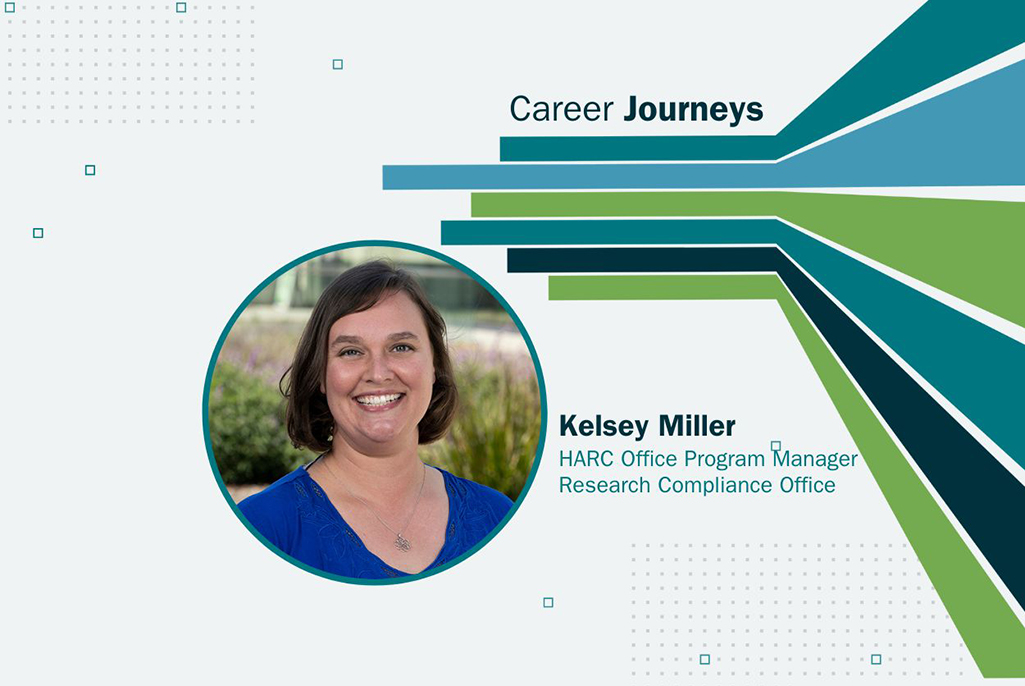Kelsey’s science career started as a vaccine researcher at Children’s Hospital in Oakland. Through that work, she became more involved with research regulations and compliance requirements, especially regarding animals. She also worked in clinical research, investigating a medical device for young patients.
Her first paying job was as a waitress. “It was a fantastic way to learn people and communication skills. I had to learn to smooth the way for those who were rushed or just hungry.”
Kelsey came to the Lab in 2021 and currently heads up the Human & Animal Regulatory Committees, or HARC Office for the Lab. HARC was recently moved to the Lab’s Office of Research Compliance in the Directorate to provide more visibility and opportunities to work directly with researchers.
Q: What was the best job you ever had?
A: My favorite job is the one I have now. It is the perfect combination of all the things I love about science. I enjoy researchers. In my first research job, I quickly realized that researchers have a lot on their plate. They are being asked to do everything. The more that we on the operations and compliance side can help them and make that a smooth process, the more it makes a difference, and that’s what I really want to do.
However, the most fortuitous job I had was hostessing in a restaurant. That’s where I met my husband, who was the sous chef. Oh my, that sounds like a plot for a rom-com.
Q: Was there something in your childhood that led you to the career path that you’re on?
A: I’ve always been interested in the human body. I wanted to be a doctor. That was always my answer when people asked me what I wanted to be when I grew up. I ended up focusing on infectious diseases, and a lot of that is because my godfather, my uncle, passed away when I was about five or six. He had HIV and AIDs, and I think that was one of the key things that changed my focus. That’s what I thought about when I received my master’s degree in infectious diseases and vaccinology.
Q: Who was your most influential mentor, formal or informal, and how did they shape your career path?
A: It’s hard to pick one person, but one person who made a difference was a professor that I had at UC Berkeley. Dr. Sensabaugh was a long-time professor at UC Davis and Berkeley.
His was the first lab I worked in, and he inspired me to find something that I’m really passionate about and that I love and not let the expectations hold me back.
Q: What mistake or setback has taught you the most?
A: When it comes to mistakes, I’ve made quite a few. However, one thing that I do not regret is not focusing on my career when I was an undergrad. I used college as an opportunity to figure out who I was, and when I graduated, I had no idea what I would do. It was a very scary time, but having that time to focus on myself and what interests me allowed my career path to develop a little more organically. It was the most beneficial thing that could have happened.
Q: What’s the most important piece of career advice you can share?
A: Exploration is the key. I think we often grow up under the impression that there’s a straight career path for everyone, and you have to pick something early on and stay on the same path. But that’s unrealistic and doesn’t always lead to the best opportunities for you. Careers are about jumping to everything that interests you and letting it all come together.
When I first worked in research, I was there because I love science, but I realized that maybe doing experiments every day wasn’t what I wanted. I took every opportunity I could find, and it wasn’t until I’d done six different things in that one institution that I realized that a job like the one I have now is perfect since it mixes so many things. And I also know that this probably isn’t my last job, right? Who knows what comes next? I’m staying open to options and exploring all the time.
It’s a journey, absolutely it really is. It’s a voyage that you need to let happen. Stop and look around. Don’t let your vision of what’s at the end be the only thing you think about.
Resources
- Human Subjects webpage
- Human Subjects in Energy Technology and Policy Research Report
- Human & Animal Regulatory Committees (HARC) Office Hours – Mondays from 2 to 3 p.m. and Thursdays from 9 to 10 a.m.
- Email the HARC Help Desk
- Read about the Department of Energy’s Symposium on human subjects best practices
